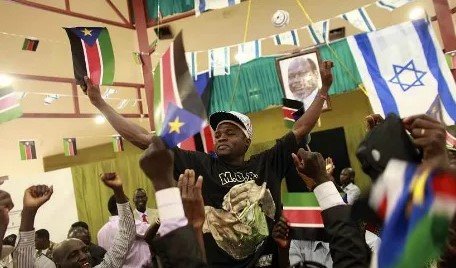South Sudan and Israel signed a memorandum of understanding on bilateral cooperation in Juba on August 13, 2025, amid swirling claims that the deal could involve resettling Palestinians from Gaza. Officials from both nations hailed the pact as a step toward stronger diplomatic ties, but South Sudan’s government quickly denied any discussions on migration, sparking global controversy and questions about the agreement’s true intent.
The Historic Signing in Juba
The agreement came during a visit by Israeli Deputy Foreign Minister Sharren Haskel to South Sudan, marking Israel’s first official delegation to the world’s youngest nation. Haskel met with President Salva Kiir Mayardit and Foreign Minister Monday Semaya Kumba, signing the MoU that focuses on diplomatic consultations and joint initiatives.
This event highlights growing relations between the two countries, which share a history of Israeli support during South Sudan’s independence struggle. The signing took place against a backdrop of regional instability, with South Sudan facing ongoing internal conflicts and Israel dealing with post-war challenges in Gaza.
Officials described the pact as a framework for future collaboration in areas like health and security. Haskel visited an Israeli-funded trauma center in Juba, noting its role in saving children’s lives, which underscores the humanitarian angle of the ties.
Key Details of the Memorandum
The MoU establishes regular diplomatic talks and explores joint projects, though specifics remain vague. South Sudan’s foreign ministry stated the deal aims to boost economic and technical cooperation without mentioning migration.

Analysts point out that such agreements often pave the way for broader partnerships. In recent years, Israel has signed similar pacts with African nations to expand influence and address mutual concerns like security threats.
Here are some potential areas of focus based on public statements:
- Health initiatives, including medical training and equipment sharing.
- Agricultural technology transfers to aid South Sudan’s food security.
- Security consultations to combat regional instability.
The lack of detailed clauses has fueled speculation, especially given the timing amid Gaza’s humanitarian crisis.
Experts suggest the pact could lead to investments, with Israel offering expertise in water management and defense, areas where South Sudan needs support after years of civil war.
Resettlement Claims and Official Denials
Reports emerged claiming Israel is in talks with South Sudan and other countries to resettle Palestinians displaced from Gaza, a war-torn area still recovering from conflicts. Sources indicate discussions involve up to a million people seeking new homes, but South Sudan’s foreign ministry firmly rejected these ideas on August 13, 2025.
The denial came swiftly after media outlets published stories about potential migration deals. Officials in Juba stressed that no such negotiations occurred, calling the reports baseless and harmful to diplomatic efforts.
This controversy echoes past proposals where Israel explored resettlement options in Africa for Gaza residents. In 2024, similar talks with other nations drew criticism for ignoring Palestinian rights to return home.
Human rights groups worry that any forced relocation could violate international law, especially after global courts ruled on the need for displaced Palestinians to reclaim their residences.
Global Reactions and Social Media Buzz
The news triggered strong responses worldwide, with activists and governments voicing concerns. On social platforms, users debated the ethics of resettling people from Gaza to a nation like South Sudan, which faces its own humanitarian issues, including famine risks and violence.
Palestinian leaders condemned the rumored plans, arguing they undermine the right of return established in international agreements. Meanwhile, some Israeli officials have publicly supported voluntary emigration as a solution to Gaza’s overcrowding.
| Date | Event | Key Details |
|---|---|---|
| August 12, 2025 | Israeli delegation arrives in Juba | First official visit, meetings with top officials |
| August 13, 2025 | MoU signed | Focus on bilateral cooperation; resettlement claims surface |
| August 13, 2025 | South Sudan denial | Foreign ministry rejects talks on Gaza Palestinians |
| August 14, 2025 | Global backlash grows | Social media outrage and international statements |
This timeline shows how quickly the story evolved, reflecting the sensitive nature of migration in conflict zones.
Historical Ties Between the Nations
Israel and South Sudan have deep-rooted connections dating back to the 1960s, when Israel provided aid during Sudan’s civil war. This support helped South Sudan gain independence in 2011, fostering goodwill that persists today.
Recent events, such as Israel’s humanitarian projects in Juba, build on this foundation. The trauma center visited by Haskel is one example, having treated hundreds amid South Sudan’s conflicts.
These ties come at a time when Gaza’s situation remains dire, with over two million people displaced since escalations in 2023. Logical reasoning suggests nations like South Sudan, with vast land but economic struggles, might be seen as resettlement options, though experts warn of logistical nightmares.
Potential Implications for the Region
If resettlement talks advance, they could reshape Middle East and African dynamics. For South Sudan, influxes of people might strain resources but bring international aid and investment.
For Palestinians, voluntary programs offering incentives like jobs and housing have been floated in past reports, but many reject them, fearing permanent loss of homeland. In 2025, with Gaza rebuilding under fragile ceasefires, such ideas gain traction yet face fierce opposition.
Balancing humanitarian needs with political realities will be key. Analysts predict more pacts like this as global migration pressures rise due to conflicts and climate change.
The debate highlights broader issues, including how nations handle displacement ethically. As of now, the MoU stands as a diplomatic win, but its long-term effects remain unclear.
What do you think about this developing story? Share your thoughts in the comments below and spread the word to keep the conversation going.
